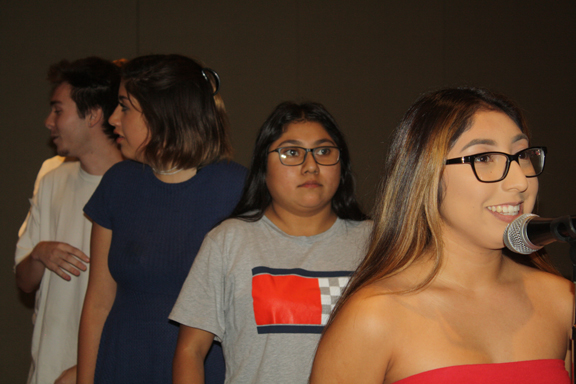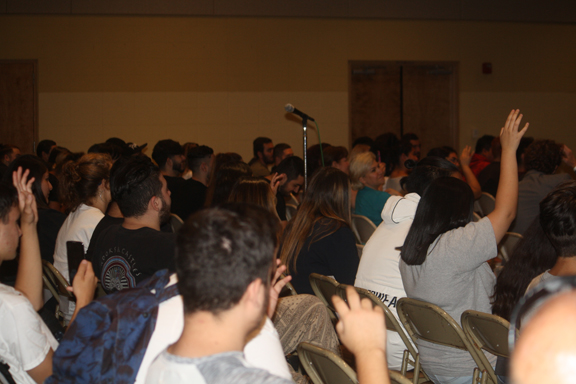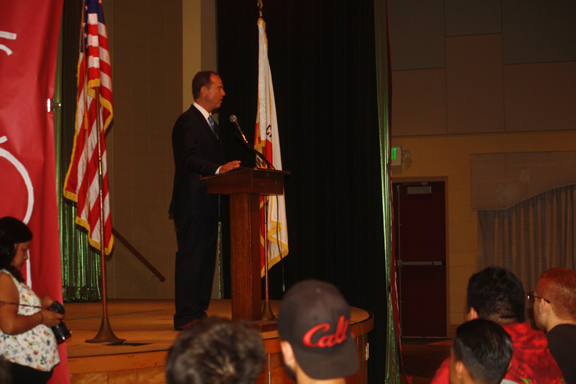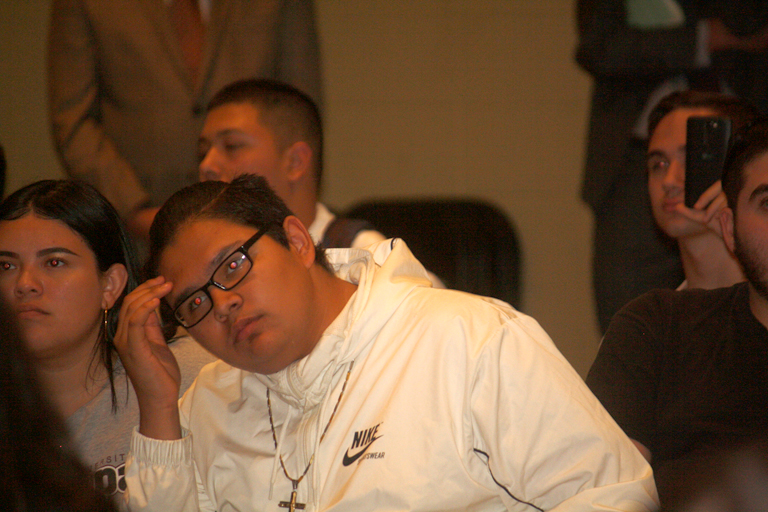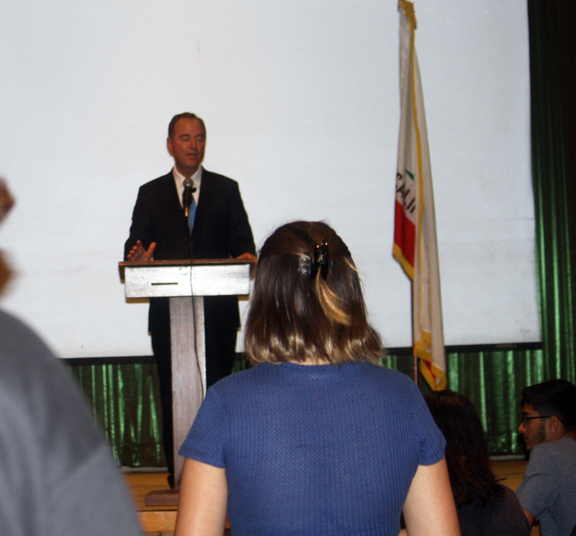
Congressman Adam Schiff answers a question from a Daily High School student during his visit to the school last week.
By Mary O’KEEFE
Last week Congressman Adam Schiff visited Daily High School in Glendale. To prepare for the Congressman’s visit, over 50% of the students submitted questions they wanted the congressman to address. The questions were reviewed and several students were chosen to be the ones who asked Schiff their questions.
The topics ranged from gun control to what the workforce will look like in the future. The questions were well thought-out and honest; however, before Schiff’s arrival some of the students were a little nervous to meet him. But they needn’t have been.
“These are the best questions I have ever been asked,” Schiff said.
Schiff began the talk, which was held in a large room at the First United Methodist Church across the street from the school, by letting the students know a little about him, including that he is a Raiders fan.
“I represent a total of about 750,000 people,” he said.
Schiff’s district stretches from Jet Propulsion Laboratory to Hollywood. He asked if anyone in the audience knew of JPL.
“That is where they design and operate the rovers we send to Mars,” he said.
He explained how districts are formed and how they are changed every 10 years after the census is taken. The data obtained by the census is used in a variety of ways including determining how many representatives each state is allowed. He said that for California to continue to be strongly represented it is important that all people are counted.
“It is important to participate in the census,” he said.
Schiff is on two separate committees in Congress: Intelligence Committee and Appropriation Committee. The Appropriation Committee, he explained, works on how much money is budgeted for specific areas like education, health care, transportation and national defense. The Intelligence Committee keeps an eye on the intelligence agencies like the CIA.
“We make sure all agencies are talking to each other and providing the information that keeps our country safe, but that they are also doing it in a way to protect our privacy, civil liberties and civil rights,” he said.
Schiff said recently this committee has been working on the Russian election interference investigation. He told the students that many times what they see on their social media is not coming from who they think it is. A message may appear to be from someone in Texas, for example, but may actually be from someone in Russia.
“How do you get your news?” Schiff then asked.
Social media was, by far, the most popular way students got their information.
“This is, I think, a characteristic response from across America,” Schiff said.
He told students to be cautious of what they read and don’t take everything they see on social media as fact because it is, many times, designed especially for them.
“What you see on your Twitter account is not what I see on my account,” he said. “We often see the news we want to see, and don’t see the news we don’t want to see. It has an effect on hardening our opinions and making it more difficult to talk to other people because they are seeing something different.”
This related to a question asked by one of the students concerning bipartisanship.
“I know when you watch the news and it looks like there is nothing but endless fighting between parties, you would get the impression that there is no bipartisanship at work,” he said. “That isn’t the case. All too often the work that is done in a bipartisan way isn’t getting any public attention because what tends to get [attention] is the fight.”
He spoke of working closely with longtime fellow Congressman John Culberson, a Republican from Texas, in support of JPL.
Schiff added he and Culberson have opposite opinions on immigration.
“We by and large don’t discuss immigration. We focus on the areas we do agree on,” he said.
One of the champions of working in a bipartisan way was John McCain, he said. Senator John McCain passed away on Aug. 25.
“We could use a lot more people in Congress like John McCain,” he said to the applause of the students.
Another question posed to Schiff dealt with the future of the workforce. He shared an encounter he had with an Uber driver. He was a man who had a day job and drove at night. Schiff spoke of how the man is an example of how the job market is changing.
“The old model of where you stay at the [same] company your entire life is [not the way it is now],” he said.
He spoke of the economy going through a change in which people may have to work two or three jobs with none of them offering health care or a retirement plan.
“[People] are working morning, noon and night. What do they do if they get sick?” Schiff asked.
The concern he said he has with this model not only deals with health care but also with what people will do when they retire and do not have a plan.
One of the first questions Schiff was asked was of a more personal nature; had he had any setbacks in his life and, if so, how did he learn from them?
“I have had my share of setbacks and I didn’t view them as helping me at the time,” he said. “The first time I ran for office I lost, the second time I ran for office what do you think happened?”
“Lost,” answered the crowd.
“The next time I ran I won,” he said.
He told the students he felt the losses made him a better representative because it made him more responsive.
“You are going to have setbacks and if you don’t have setbacks in life then you are not aiming high enough,” Schiff said. “It is not a question of having setbacks but how are you going to [respond] to those setbacks.”

